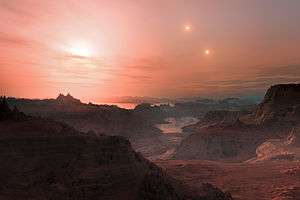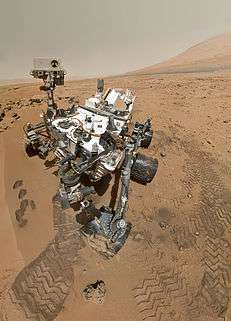Kepler-88
| Observation data Epoch Equinox | |
|---|---|
| Constellation | Lyra |
| Right ascension | +19:24:35.54 |
| Declination | +40:40:9.87 |
| Apparent magnitude (V) | 13.113 |
| Characteristics | |
| Astrometry | |
| Distance | 1105 ly (339 pc) |
| Details | |
| Mass | 0.96 M☉ |
| Radius | 0.88 R☉ |
| Temperature | 5471 K |
| Metallicity [Fe/H] | +0.2 dex |
| Age | 3.9 ± 0.3 Gyr |
| Other designations | |
KOI-142 | |
Kepler-88 is a Sun-like star with two confirmed planets. In April 2012, scientists discovered that a Kepler candidate KOI-142.01 (Kepler-88b) exhibited very significant transit timing variations caused by a non-transiting planet.[1] Timing variations were large enough to cause changes to transit durations to Kepler-88b as well. Large transit timing variations helped to put tight constraints to masses of both planets. The non-transiting planet was further confirmed through the radial velocity method in November 2013.[2]
Planetary system
Kepler-88's inner planet is Neptune-sized but almost half as dense. The outer planet is about 60% as massive as Jupiter but its radius is not known due to not transiting the planet.
| Companion (in order from star) |
Mass | Semimajor axis (AU) |
Orbital period (days) |
Eccentricity | Inclination | Radius |
|---|---|---|---|---|---|---|
| b | 8.70 M⊕ | 0.098 | ~10.95416 | 0.056 | 89.055° | 3.780 R⊕ |
| c | 0.626 MJ | 0.15525 | 22.3395 | 0.056 | 86.2° | — |
References
- ↑ KOI-142, the King of Transit Variations, is a Pair of Planets near the 2:1 Resonance: David Nesvorný, David Kipping, Dirk Terrell, Joel Hartman, Gaspar A. Bakos, Lars A. Buchhave. 15 April 2013
- ↑ SOPHIE velocimetry of kepler transit candidates:X KOI-142c: first radial velocity confirmation of a non-transiting exoplanet discovered by transit timing: S.C.C. Barros (1), R. F. Diaz, A. Santerne, G. Bruno, M. Deleuil, J.M. Almenara, A.S. Bonomo, F. Bouchy, C. Damiani, G. Hebrard, G. Montagnier, C. Moutou (1- Laboratoire d'astrophysique de Marseille)2
This article is issued from Wikipedia - version of the 8/30/2016. The text is available under the Creative Commons Attribution/Share Alike but additional terms may apply for the media files.

